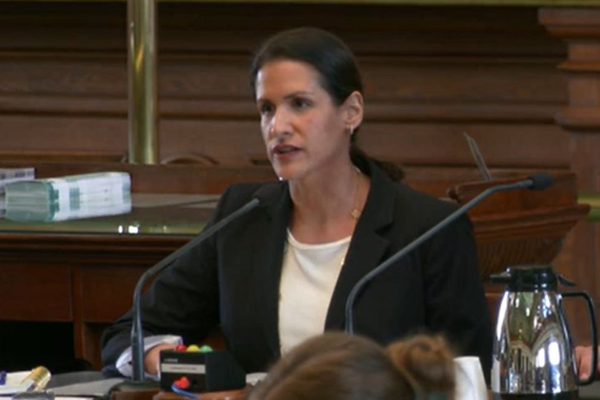
As state lawmakers chart a path forward after the Robb Elementary school shooting in Uvalde last month, the Texas Medical Association is offering stories of hope that illustrate promising potential solutions: investments in mental health systems that can intervene before a troubled youth becomes a perpetrator of gun violence.
Lubbock pediatrician Celeste Caballero, MD (above), testified for TMA at the June 22 hearing of the Senate Special Committee to Protect All Texans – formed in response to the Uvalde shooting – and shared positive experiences supporting TMA’s approach to preventing future gun violence. TMA is asking lawmakers to:
- Support and bolster the state’s mental health care system. That includes not only the state’s roster of psychiatrists – which, by one estimate, is short of what Texas needs by about 1,000 – but also the primary care physicians who are “generally the doctors that families are seeing first for mental health care,” Dr. Caballero said in her testimony.
- Enhance family child interventions and augment investments in social services to build “strong, resilient Texas families,” Dr. Caballero said.
On both counts, Dr. Caballero relayed inspirational personal experiences from her career that showed why these steps are crucial.
Last year, she was working in her urgent care setting when a father came in with an adolescent son who clearly “had a serious mental health illness,” she said. “I felt that this child, this adolescent, needed help immediately, and I also felt that I needed the help of a psychiatrist.”
She contacted the Child Psychiatry Access Network, the TMA-supported state mental health service that offers pediatricians and family physicians telemedicine-based professional advice from psychiatrists. Within five minutes, Dr. Caballero was on the phone with one.
“I was able to give the details of the case, and the psychiatrist gave me his opinions [and] his recommendations,” she told the committee. “That moment, that day, the adolescent received the mental health care that he needed.”
On child interventions and social services, Dr. Caballero detailed the potentially severe impact of adverse childhood experiences, or ACEs. Those can include child abuse or neglect, witnessing parents’ drug use or alcoholism, parental divorce or separation, or even something as common as a death in the family.
An effective response to ACEs can be a powerful push to a better life, Dr. Caballero testified. She gave an example of a young patient she had whose parents began using methamphetamines. The child, whom Dr. Caballero was treating for poorly controlled asthma, was twice removed from his home over a six-year period. But the support of “wonderful foster parents” and teachers helped develop a happy, resilient, and accomplished child – who was eventually reunited with his parents after they worked hard to kick their substance use disorder. His asthma even improved, Dr. Caballero said.
“We know as physicians that positive experiences in childhood – specifically safe, secure, nurturing relationships with trusted adults, such as teachers, extended family members, parents, counselors – we actually know that those types of relationships can negate the toxic effect of ACEs,” she said. “And that’s a powerful thing.”
After Dr. Caballero finished her statement, several committee members expressed appreciation for her testimony. One of those lawmakers, Sen. Donna Campbell, MD (R-New Braunfels), thanked Dr. Caballero for her focus on “the mental health that we need to bolster and show support for, rather than just addressing an inanimate object.”